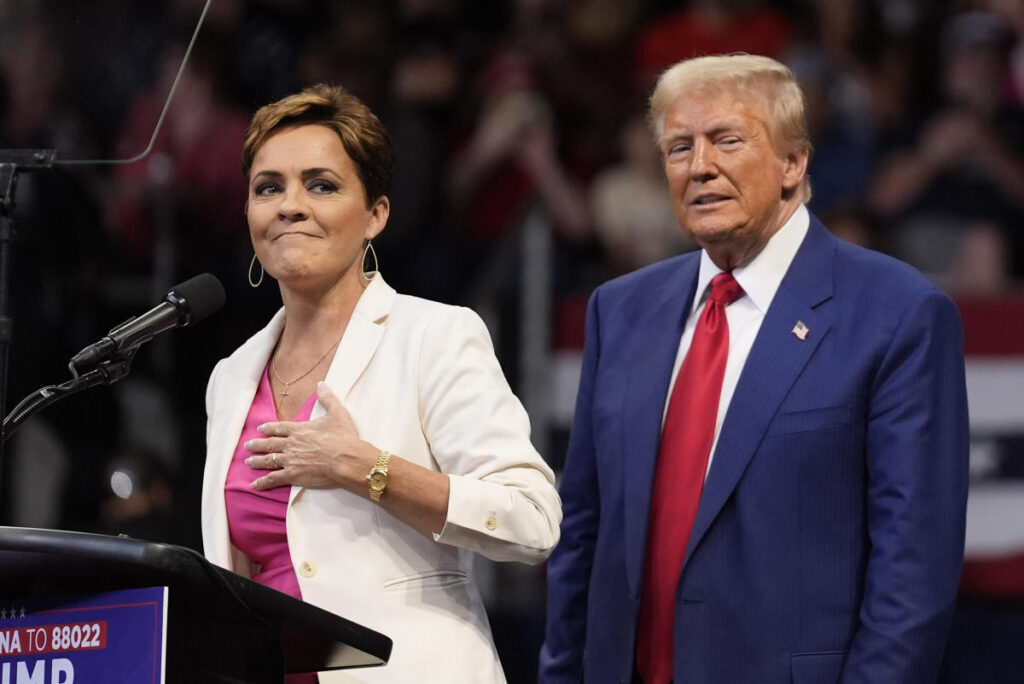Kari Lake’s Senate campaign in Arizona, heavily tied to Donald Trump, reflects a struggle to galvanize enough support from conservative voters, highlighting a schism among Republicans. Despite her identification as a Trump protégé, Lake has not succeeded in consolidating the coalition backing Trump within the state. Traditional conservative voters, including those who align more closely with the late Sen. John McCain, appear to be distancing themselves from her and Trump’s polarizing brand of politics. Consequently, while Trump finds himself in a tight race against Vice President Kamala Harris, Lake lags well behind her Democratic opponent, Rep. Ruben Gallego. Polling indicates that Lake’s connection to Trump may be undermining her appeal to independents and moderate Republicans.
Lake’s self-described strong relationship with Trump has not translated into a robust electoral strategy. Despite her claims of positive internal polling results, indicating she is ahead of Gallego, she struggles to make headway among broader voter demographics. This disconnect is visible, given that by mid-October, Gallego had raised nearly triple the funds Lake has secured, allowing him substantial media exposure to define his campaign narrative. Public polling places Gallego consistently ahead of Lake, with indications that he is attracting cross-party support from anti-Trump Republicans and moderate voters disillusioned by the extremities of the MAGA movement. Lake’s efforts to charm moderates, based on her candidacy for governor where she initially alienated McCain Republicans, seem to be falling short.
Gallego’s campaign strategy leans heavily on building a diverse coalition that includes hard-core progressives and Latino voters. He emphasizes his military background to reach out to patriotic Latino men, which resonates well within these communities. In contrast, Lake’s strategy remains focused on rallying her MAGA base rather than expanding her voter reach. Gallego’s efforts in Latino neighborhoods to connect through culturally relevant events and community-targeted outreach have been effective, as he captures interest from voters willing to split their tickets between him and Trump. This has allowed Gallego to establish a more promising campaign trajectory compared to Lake’s increasingly insular approach.
While both candidates navigate their campaigns under the male gaze, with Trump and Gallego representing the male electorate, Lake’s brand of aggressive politics sets her apart, leading to scrutiny and discord among her potential supporters. Despite her denials regarding the impact of sexism on her campaign, some perceive a double standard in how her blunt communication style is received compared to Trump’s. Lake insists that her message transcends gender-based criticisms and is focused on the policies she supports, while her campaign appears to lack the foundational cohesion necessary to connect with broader Republican voter bases.
Although she has attempted to reach out to former McCain supporters, claiming successful dialogues, many remain skeptical of her sincerity, recalling their previous alienation during her gubernatorial run. This ongoing discord highlights her difficulties in uniting the Republican Party behind her candidacy. Meanwhile, Gallego has successfully leveraged his connections with both independent voters and disenchanted Republicans, drawing support that positions him favorably in the election landscape. His message, which at times critiques Trump while courting moderate Republican sentiment, showcases a different approach that has proven to resonate positively with voters.
In light of these dynamics, Lake’s funding deficit remains a critical obstacle in her campaign. While Gallego has been able to dominate the advertising battleground and utilize past statements from Lake against her effectively, she finds her narrative stifled. Despite assurances from her camp that they are only a few points behind Trump in some internal polls, the extensive gap in fundraising undermines her capacity to reach a broader electorate effectively. As she continues her campaign, the broader implications of her political maneuvering amidst distinct voter sentiments in Arizona represent a cautionary tale for others looking to replicate Trump’s brand of divisiveness within the Republican Party.

